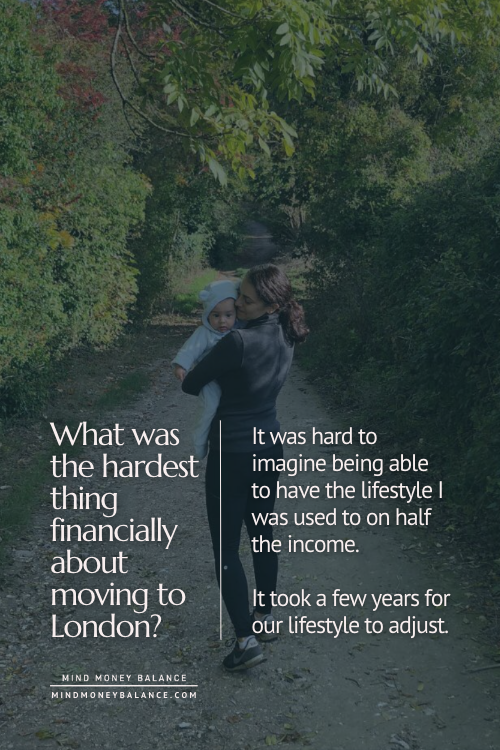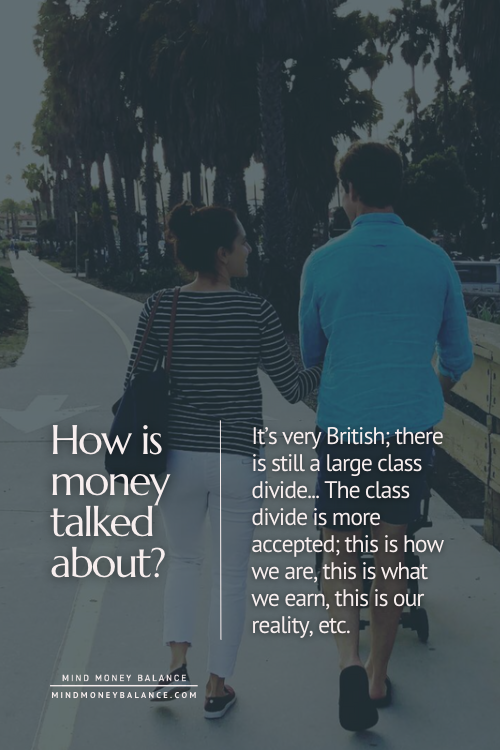Moving to London: Money Tips from The Worth Project
I had the pleasure of being interviewed by The Worth Project’s Erica Gellerman to talk about what got me into financial therapy (read about it here). She generously returned the favor and let me do a mini financial therapy assessment and open up about some big differences she sees with money and lifestyle living abroad with her husband and son.
Of the four money scripts, avoider, worshipper, vigilant, and status, Erica most closely fit into the “Avoidance” category. For a person who literally talks about money for a living, it does seem counterintuitive that she’d be considered an avoider! The unfortunate reality of the financial therapy field is that it’s dominated by a couple of guys who have gotten their data from mostly white males. When I shared this with, Erica, she said, “that makes so much sense. I read the money scripts study that breaks down the four types of money behaviors, and I didn’t find myself in any other the categories.” Below, you’ll see the rest of our conversation. Enjoy!
What was it like to hear you are most likely to be a money avoider?
Surprising. I feel like I don’t avoid looking at my money. I love learning about it, looking at our investments, and making good financial decisions. I never have anxiety logging into our bank accounts. I can’t believe I’m a money avoider! That sounds so depressing.
Alright, let’s talk about the here-and-now. What brought you and your husband abroad?
My husband Jordan works for an energy company. Most of our relationship was long distance. He was in Hawaii, I was in North Carolina. Then he moved to Bangladesh and I moved to Los Angeles. When we were married for just over a year, he was offered a position in London. It was time for us to be together in the same place so off to London we went!
What was the hardest thing financially about moving to London?
The hardest thing to adjust to was the salary being so different. Moving to London meant my marketing salary would be cut in half; literally 50-60% less than what I’d make in the United States. It was hard to take that lower salary when you figure in moving to a place with such a high cost of living. I could feel the cut of my salary. I didn’t understand what life would be like in London; it was hard to imagine being able to have the lifestyle I was used to on half the income.
It was hard to imagine being able to have the lifestyle I was used to on half the income.
It took a few years for our lifestyle to adjust. How we spend money here is so different than how we spend money in the U.S. Every time we go home, we find ourselves saying, “Oh my gosh, everything is so expensive.” I am shocked by how much Americans spend. New cars, new restaurants, new everything.
What are some of the big cultural differences that show up financially?
Socializing is so much more expensive in the States. Most museums in London are free, parks are free, and going out to meals isn’t as costly. We find ourselves eating out much less frequently because there aren’t as many takeaway options. The city isn’t set up for ordering out.
In the US, when you are starting to connect with someone, you go grab drinks. Here, they don’t do that. They invite you over to their home for tea and cake. If I was having someone over for the first time in the States, I’d have a lovely cheeseboard and something pretty fancy. But here, it’s simpler. We literally do tea and scones to socialize.
What about shopping?
Every single town will have these beautifully curated thrift shops right on their main street. They are called charity shops and everyone donates and shops there. Thrifting in the US is more about the hunt to find unique vintage pieces, but these types of shops are everyday kind of shopping.
And housing?
Our friends back home probably look at our 2-bedroom as unlivable, but Londoners see a 2-bedroom and think, “gosh this is big.”
We have less space than in the US. Our friends back home probably look at our 2-bedroom as unlivable, but Londoners see a 2-bedroom and think, “gosh this is big.” Being here and having other British friends and adopting some of their spending habits around kids, we’ve adopted a lot of the same ideals. [Our son] doesn’t have a ton of stuff or a ton of clothes. There are £1 playgroups all over the place which allows us to socialize and let him play with other kiddos for a low price.
How is money talked about?
It’s very British; there is still a large class divide, even more so than in the U.S. The culture around class and money is that people are more static. They do not have the American Dream mentality. It feels very much like things are a given. The class divide is more accepted; this is how we are, this is what we earn, this is our reality, etc.
If you are a higher income earner, you talk in a roundabout way of how much money a person has or earns. You wouldn’t say, “they bought a £50M home,” but you might say, “they get their suits tailored on Savile Row.” Savile Row is a posh street lined with bespoke tailors. It’s really rare to hear someone come from British generational wealth talk about being practical with their money. To hear someone say something like, “we prefer to do these activities because they cost too much,” or “we don’t spend there,” is refreshing but it’s rare.
In a middle or lower-middle class setting, you hear money talked about more openly. Their conversations are so direct. Even more so than with some of your closest friends back in the States.




